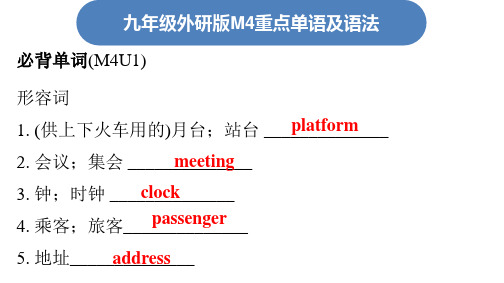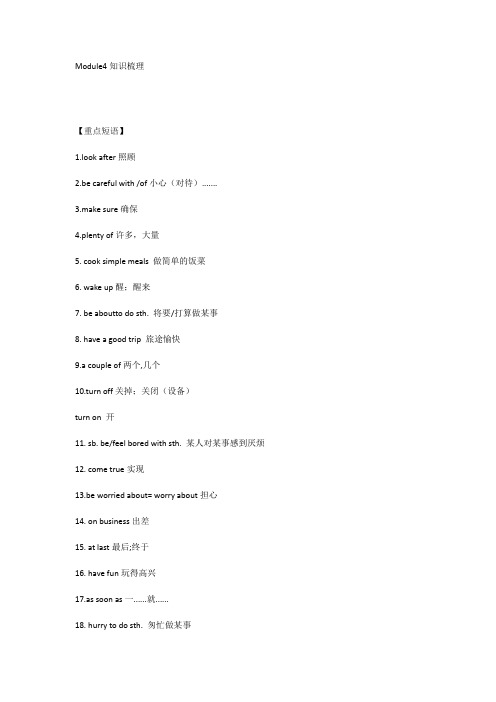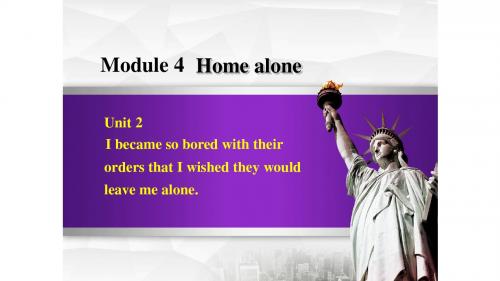外研社九年级上册英语 Module 4 词汇和语法基础(解析版) (2)
- 格式:docx
- 大小:74.56 KB
- 文档页数:13

外研九年级上m 4 知识点外研九年级上m4知识点外研九年级上的Module 4主要涉及了英语语法、词汇和阅读理解等方面的知识点。
本文将对这些知识点进行详细的介绍和解析。
一、语法知识点1. 过去完成时:过去完成时是指在过去某个时间之前已经发生的动作或存在的状态。
它的形式是had+过去分词,通常与表示一段时间的状语连用。
例如:By the time she arrived, we had already finished the work.(她到达时,我们已经完成了工作。
)2. 现在完成时与过去完成时的区别:现在完成时强调与现在的关系,通常与表示到目前为止的时间状语连用;而过去完成时强调与过去的关系,通常与表示过去某个时间点的状语连用。
3. 虚拟语气:虚拟语气用来表示假设、愿望、建议等非真实的情况。
常见的虚拟语气形式有:would/should/could/might+动词原形;had+n.(过去完成时)+动词过去分词;如果从句中主语与谓语动词之间是be动词,常使用were来表示虚拟语气。
二、词汇知识点1. 单词拼写:学习英语单词时,正确的拼写是非常重要的。
在Module 4中,我们需要注意一些常见的单词拼写,例如:convenience、comparison、ascent等。
2. 同义词辨析:在学习英语时,我们经常会遇到一些同义词,需要注意它们的细微差别。
例如:begin/start、happen/occur、choose/select等。
3. 词性转换:同一个词可以根据用法和意义的不同,变换成不同的词性。
例如:adjective→adverb(slow→slowly)、verb→noun (decide→decision)等。
三、阅读理解知识点1. 阅读技巧:在做阅读理解题时,我们需要注意一些阅读技巧。
例如,首先快速浏览全文,了解文章的大意;然后仔细阅读每个段落,注意关键词和句子;最后根据问题和选项,选择正确的答案。


Module4知识梳理【重点短语】1.look after照顾2.be careful with /of小心(对待).......3.make sure确保4.plenty of许多,大量5. cook simple meals 做简单的饭菜6. wake up醒;醒来7. be aboutto do sth. 将要/打算做某事8. have a good trip 旅途愉快9.a couple of两个,几个10.turn off关掉;关闭(设备)turn on 开11. sb. be/feel bored with sth. 某人对某事感到厌烦12. come true实现13.be worried about= worry about担心14. on business出差15. at last最后;终于16. have fun玩得高兴17.as soon as一......就......18. hurry to do sth. 匆忙做某事19. ask sb. for sth.向某人要某物20. hand in上交18. be unable to do sth.不能做某事19. feel tired and sleepy 感到又累又困20. help sb. with sth. =help sb. (to) do sth.21. tidy up收拾;整理22. Plan to do sth. 计划/打算做某事22. depend on依靠;依赖;取决于23. say goodbye to sb.和某人道别24. see sb.off送别某人25. be busy doing sth.be busy with sth.26. be /get readyfor sth. 为某事准备好be/get ready to do sth. 准备好做某事27. get sth.ready 把某物准备好We must get dinner ready. The guests are coming. 28. in a hurry 匆忙hurry up 赶快29. by accident= by chance 意外地,偶然地30. later on以后,后来31. take away 拿走,带走32. in danger 处于危险中33. all day long整天34. point out 指出35. call the police 报警36. clean up清理37. fight with 与……打架【用法集萃】1. so+be动词/助动词/情态动词+主语........也是如此2. so+形容词/副词+that从句如此......以至于3. lots of+可数名词复数/不可数名词许多......4. advise sb. to do sth.建议某人做某事5. be about to do sth.即将做某事6.want to do sth.想要做某事7. a bit+形容词/副词有点.....8. have to do sth.不得不做某事9. a few+可数名词复数几个......10.be unable to do sth.不能做某事11. try to do sth.设法做某事12. want sb to do sth.想让某人做某事13. start to do sth.开始做某事14. be happy to do sth.做某事很高兴15. tall sb. to do sth.告诉某人做某事16. learn to do sth.学会做某事17. be busy doing sth.忙于做某事【话题写作】1、今天是6月21日,父亲节。



Module 4 Home alone重要知识点讲解Unit 1一、重点短语be careful with 小心(对待);注意look after 照顾;照看make sure 确保;设法保证plenty of 许多;大量;充分的wake up 叫醒;喊醒;使...醒来advise sb to do sth.建议某人做某事be about to do sth.即将做某事send sb a text message 给某人发短信have a good trip 旅途愉快a couple of 两个;少数几个二、So am I[点拨](1)英语中在表示“某人/物和……一样”时(表肯定),常用“so+情态动词/助动词/系动词+另一个主语”,常翻译为“……也……”或“……也是”,主语不是同一人或物。
Tom is a student, so is Lingling.汤姆是一名学生,玲玲也是。
(2)表示“某人/物一样不……”时(表否定),常用“neither/nor+情态动词/助动词/系动词+另一个主语”,常翻译为“……也不……”或“……也不”,主语不是同一人或物。
Sally can't play the violin, neither/nor can I.萨利不会拉小提琴,我也不会。
(3)“so+主语+助动词/情态动词/系动词”则表示“……确实是这样”,主语是同一个人或物。
--Tom was late this morning. ---So he was. ——汤姆今天早上迟到了。
——他确实迟到了。
三、so ... that “如此……以至于”[点拨]“so+形容词或副词+that ...”引导结果状语从句。
The boy is so young that he can't look after himself.这个小男孩太小了以至于他无法照顾好自己。
He was so late that he missed the early train. 他如此的迟以至于错过了早车。
Module 4 Home aloneUnit 2 I became so bored with their orders that I wished they would leave mealone.1.Actually, they managed every minute of my life.(教材第28页)实际上,他们支配了我生活中的每一分钟。
(1)actually[副词]“实际上,事实上”,修饰句子时,可与“in fact” 互换。
不过,in fact 更正式,actually比较随意。
in fact常位于句首,actually在句中位置灵活,句首、句中、句末等都可。
此外,actually作为副词还可以修饰动词、形容词、副词;in fact 都不可以。
✧Actually I have been teaching English for twenty years.其实我已经教英语20年了。
✧However, this can actually be a good thing.但是这实际上也是好事。
(2)manage [动词]①“管理;支配”✧She has very good people skills and is able to manage a team.她人际交往能力很好,能够管理一个团队。
② manager [可数名词] “经理,管理者”✧Betty’s mother is the manager of a big theatre.Betty的妈妈是一家大剧院的经理。
② manage[动词]“做成;(尤指)设法完成”manage to do sth.设法做成某事(Module3已讲)而try to do sth. 指“试图/努力做某事”,但不知是否成功。
✧How did you manage to finish such great work on your own?你是怎样一个人完成了如此艰巨的工作?(2021·全国·单元测试)I believe that he’s able to ________ the department store.A. tryB. manageC. orderD. use2.Although they loved me, I felt a bit unhappy with them.虽然他们爱我,但是我对他们有点儿感到不满意。
Module 4 知识点一:现在进行时表示将来:当表示计划好或准备要做某事时,可用现在进行时表示将来例:Jim is going boating this afternoon。
吉姆今天下午要去划船Are they all coming tomorrow?他们明天都要来吗?例:Dad ______the USA in two weeks .A, is leave for B, leaves for C, is leaving for D, left for二,so 引导的倒装句So+be动词/助动词/情态动词+主语:表示前面所说的情况也适用于另一个人或物be动词/助动词/情态动词,要和前一句的谓语动词保持一致。
此处的so 和副词“这样,这么”及连词“因此,所以”不同,在这个句型中,so 常用来代替上文中的形容词,名词,或动名词,表示赞同。
例:She is an English teacher .So am I .He can swim ,and so can I.例:Sandy likes English best .She reads the texts every day .A, So does Jim B, So Jim does C, So Jim is D, So is Jim三:so +主语+谓语和so +谓语+主语的区别:当两个句子指的是两个人时,so 后句子用倒装例:He is a student .So am I .他是一个学生。
我也是。
当两个句子指的是同一个人时,so 后句子不倒装。
例:Lucy likes dark blue . So she does .路西喜欢深蓝色。
确实如此。
例:______exciting news it is ! Disneyland in Shanghai has opened to the public!_______.We plan to go there this summer holiday.A, What an ; So is it . B, What ;So it is . C, How ;So it is . D, How; So is it .四,as 和like 作介词的用法As 用作介词,“作为,当作”例:I found a job as a guide .Like 用作介词,like 前边一般要有be 动词,翻译为“像。
知识图谱Module 4 Home alone知识精讲一、必背词汇platform [ˈplætfɔ:m]n. (供上下火车用的)月台,站台meeting [ˈmi:tɪŋ]n. 会议,集会miss [mɪs]v. 未出席,未出现shut (shut, shut) [ʃʌt]v. 关上,合上lock [lɒk]v. 锁,锁住simple [ˈsɪmpl]adj. 简单的,容易的anybody [anybody] pron. 任何人clock [klɒk]n. 钟,时钟ring (rang, rung) [rɪŋ]v. 鸣响,发出铃声passenger [ˈpæsɪndʒə]n. 乘客,旅客address [əˈdres]n. 地址text [tekst]n. 文本,正文couple [ˈkʌpl]n. 一对,两个actually [ˈæktʃuəli]adv. 事实上manage [ˈmænɪdʒ]v. 管理,支配unhappy [ʌnˈhæpi]adj. 不高兴的order [ˈɔ:də]n. 命令,指示business [ˈbɪznəs]n. 工作sofa [ˈsəʊfə]n. (长)沙发snack [snæk]n. 点心,小吃midnight [ˈmɪdnaɪt]n. 午夜,子夜empty [ˈempti]adj. 空的unable [ʌnˈeɪbl]adj. 不能做某事的burn (burned /burnt, burned /burnt) [bɜ:n]v. (使)烧焦,(使)烤糊cup [kʌp]n. 杯子,一杯饮料task [tɑ:sk]n. 任务,工作二、重点词汇1. miss [mɪs]v.1). to fail to do or experience something, often something planned or expected, or to avoid doing orexperiencing something未做到;未体验;避开;幸免于例句:I missed the start of the class because my bus was late.我没有赶上考试开始,因为我坐的公共汽车晚了。
2). to arrive too late to get on a bus, train, or aircraft未赶上,错过例句:You'll miss your flight if you don't hurry up.如果你不快点,会误了航班的。
3). to feel sad that a person or thing is not present想念,惦念;怀念,思念例句:I really missed her when she went away.她离开的时候我非常想念她。
2. actually [ˈæktʃuəli]adv.1). in fact or really实际上;真实地,的确例句:So what actually happened?那么到底发生了什么呢?2). used as a way of making a sentence slightly more polite, for example when you are expressing anopposing opinion, correcting what someone else has said, or refusing an offer(用于更礼貌地表示反对、纠正他人或拒绝他人提议等)其实,说实话,实际上例句:"Alexander looks like he'd be good at sports." "Actually, he's not."“亚历山大看上去很擅长运动。
”“事实并非如此。
”3. unable [ʌnˈeɪbl]adj.to not be able to do something不能做,无法做例句:We were unable to contact him at the time.我们当时无法和他取得联系。
4. burn (burned /burnt, burned /burnt) [bɜ:n]v.1). to be hurt, damaged, or destroyed by fire or extreme heat, or to cause this to happen(把…)烧坏,(使)烧伤,(使)烧毁;(使)晒伤;(使)烫伤例句:He was badly burned in the fire.他在大火中严重烧伤。
2). to be on fire, or to produce flames着火;烧着;燃烧例句:The wood was wet and would not burn.木头湿了,烧不着。
5. task [tɑ:sk]n.a piece of work to be done, especially one done regularly, unwillingly, or with difficulty任务;(尤指经常、不情愿或很难做的)工作;(苦)差事例句:Walker had the unenviable task of breaking the bad news to Hill...沃克不得不把这个坏消息告诉希尔。
三、必背短语text message短信 a couple of两个turn off关掉,关闭(设备)be worried about担心on business出差wake up醒,醒来hand in提交,上交all day long整天四、经典句型1. Now, what’s our train number?现在看一下我们的火车班次是多少?2. So do I.我也是。
3. but I’m sorry…但是我很遗憾……4. Have a good trip!祝旅行愉快!5. Don’t worry.别担心。
6. I’ll be fine.我会好好的。
三点剖析一、考点1. advise的用法advise作动词,意为“建议”,其后不能直接接动词不定式作定语。
其用法如下:doing sth建议做某事advise sb (not ) to do sth建议某人(不)做某事that从句从句谓语动词用虚拟语气,即should+动词原形,其中should可省略例句:The doctor advised taking a week’s rest.医生建议休息一个星期。
They strongly advised him to accept the price.他们竭力劝他接受这个价格。
I advised him that he (should) stop smoking.我劝他戒烟。
2. alone 的用法1). alone作表语形容词,意为“独自;单独”,表示单独无伴这一事实,不含感情色彩。
例句:She was alone in that dark room.她独自一人待在那间黑暗的屋里。
2). alone还可以作副词,意为“单独地”,常用在名词、代词或行为动词之后。
例句:Don’t leave me alone.不要把我独自留下。
【拓展】alone和lonelylonely意为“孤独的”,常作形容词,表示寂寞的心情。
例句:Although I’m not alone, I still feel lonely.尽管我不是一个人,我仍然觉得寂寞。
二、易错点1. be about to do sth & be going to do sth1). be about to do sth表示“正要、即将做某事”,时间比较紧迫,常与when连用,但句中不能再加at once,immediately及表示具体时间的状语例句:We were about to leave when it started to rain.我们正要离开,天就下起雨来。
2). be going to do sth表示某人按计划和安排将要做某事或表示说话人根据某种迹象主观推测可能要发生的事。
例句:We are going to have our sports meeting next Friday.我们将于下周五举行我们的运动会。
2. not a bit & not a little1). not a bit表示“一点也不,毫不”例句:He is not a bit tired.他一点也不疲惫。
2). not a little例句:He is not a little tired.他非常疲惫。
题模精选题模一:advise的用法例1.1.1We advise parents _________ their children at home in order to keep them away from danger.A. leavingB. not to leaveC. leaveD. to leave例1.1.2根据句意用括号中词的正确形式填空。
I advise you _________ (have) a rest.题模二:alone 的用法例1.2.1The old man lives _________, but he doesn’t feel _________.A. alone; aloneB. lonely; aloneC. alone; lonelyD. lonely; lonely例1.2.2根据句意选择正确单词填空。
I miss my family and really feel _________ (alone / lonely) without any friends in this new city.随堂练习随练1.1Please send me a text _________ about when the meeting will be held.A. letterB. sentenceC. messageD. notice随练1.2根据句意及汉语或首字母提示写出单词。
1. If you s_________ your eyes you can’t see anything.2. Which_________ (月台) does the Brighton train leave from?3. In point of cost, we’ll have to discuss it at the next_________ (会议).4. Make my excuses to your wife, I’m sorry to m_________ her birthday party.5. The _________ (乘客) must show their ID cards before getting on the plane.随练1.3根据短文内容从方框中选择恰当的单词填空,使短文完整、通顺。